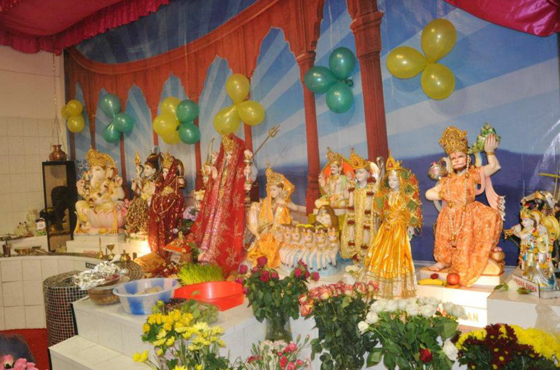 Location: Zuidoost, Amsterdam
Location: Zuidoost, Amsterdam
Main Deity: Lord Shiva
Established By: Avi Sharma on 4th June 2011
Known For: Sheltering multiple deities in one temple
Entry Fees: Free
Timing: 7:00 am to 8:30 pm
Other Deity inside the temple :Lord Ganesha, Maa Durga, Maa Saraswati, Ram Sita, Shree Hanuman, Maa Kaali and Radha Krishna
Address: Hoogoorddreef 79, Amsterdam, North Holland 1101 BB, The Netherlands
People from India have been settling down in countries all over the world due to different reasons. Once away from their home country, India, it becomes a problem for Hindus to find temples where they can offer their prayers and celebrate different religious festivals.
However, with the emergence of Hindu temples all over the world, it has become easy for Indians to connect to their gods. The Shiva Hindu Temple in Zuidoost, Amsterdam is one such temple which embodies different gods under one roof.
Even though Lord Shiva is the main deity of the temple, as can be derived from the name, the temple also has other gods such as Lord Ganesha, Maa Durga, Maa Saraswati, Ram Sita, Shree Hanuman, Maa Kaali and Radha Krishna.
Avi Sharma wanted to provide a source for the Hindu devotees where they could offer their prayers and get involved in different religious events. He thus established the Shiva Hindu Temple on 4th June 2011. This temple has been opened by keeping in mind the problem that the Hindu community faces abroad in terms of finding a place to connect with their God.
There are different deities in the temple so that people can connect to the one they worship. The temple has an area of 200 square meters and provides different sacred services and celebrates religious events throughout the year. The objective of the temple is to make the Hindu community present overseas strong and connect them through a religious bond. The Panch Mukhi Shivling is one of the main attractions of the temple. People from all over the world, even the non-Hindu devotees, come to this temple to get blessings.
The temple has a langar hall where devotees are served the Prasad or Bhojan made in the temple itself. There are different pujas, hawans, bhajan-kirtans and even marriages that are conducted in the temple. Everything including the first rites and the last rites are done in the temple. The temple also holds small religious functions which can help as bonding between the different Hindu devotees staying overseas. There are priests present at all times in the temple.
The temple remains open throughout the year, even on Sundays so it can be visited at any time. However, February and March are filled with events such as Mahashivratri, Holi, Hanuman Jayanti and Chaitriya Navratri and hence are perfect for people to visit the temple and be a part of these festivals.
The next festive season starts again from September to December where Janmashtami, Shardiya Navratri, Dussehra, Karwa Chauth, Diwali, and Gita Jayanti are celebrated.
Many festivals are celebrated in the temple all around the year such as Mahashivratri, Hanuman Jayanti, Dussehra etc. Thousands of devotees come to the temple to pay their respects.
Some of the festivals which are celebrated in the temple are as follows:
It is a Hindu festival that is celebrated as a prayer to Lord Shiva. On this day Lord Shiva is remembered and prayers are said in his honour. Devotees fast on this day and come to the temple to pray and meditate and celebrate it with enthusiasm. The festival is celebrated in the month of February.
Celebrated in the month of March, this colourful festival of Holi is celebrated with great fervour in the Shiva Hindu temple. People attend this festival to celebrate Holi for two days. The first day of the festival is called Jalanewali Holi where a bonfire is prepared. This day is also known as Holika Dahan or Chhoti Holi. On this day people attend the bonfire as a sign of the triumph of good over evil. The second day of the festival is called the Rangwali Holi. The temple is decorated beautifully and a variety of colours is present where people play.
Hanuman Jayanti is celebrated towards the end of March. This festival celebrates the birth of Lord Hanuman who is widely worshipped in India. Devotees who stay abroad and are ardent worshippers of Lord Hanuman, come to the temple during this event to pay their offerings to the God. The event is celebrated in the month of Chaitra Pournimaa on the 15th day of the Shukla Paksha.
This is a nine-day event which is celebrated in the honour of Maa Durga. During these nine days, the temple follows affixed schedule where the Aarti is done at 7:00 pm, the Prasad or Bhojan is served to the devotees at 7:00 pm and the Mata Ki Chowki is attended by many devotees between 8:00 pm to 10:00 pm.
The Dussehra festival is celebrated on the tenth day after the Navratri ends. On this day the dummies of demons Ravan, Kumbhkaran and Meghanath are burned with fireworks and crackers. Special permission from the government is derived by the Shiva Hindu Temple for this day. The entry to the event is free. There is a Dussehra Mela that begins at 1 pm. The Ravan Badh is at 6:30 pm. There is an Aarti in the temple at 7:30 pm and the Prasad or Bhojan is served at 8:00 pm.
The temple is open every day of the week, including Sundays, from 7:00 am to 8:30 pm.